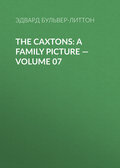
Эдвард Бульвер-Литтон
Pelham — Complete
“Well, your honour,” said he, “I’m glad you’ve told me all; we must see what can be done. As for Thornton, I’m afraid we shan’t make much out of him, for he’s an old offender, whose conscience is as hard as a brick-bat; but, of Dawson, I hope better things. However, you must let me go now, for this is a matter that requires a vast deal of private consideration. I shall call upon you tomorrow, Sir, before ten o’clock, since you say matters are so pressing; and, I trust, you will then see that you have no reason to repent of the confidence you have placed in a man of honour.”
So saying, Mr. Job Jonson emptied the remainder of the bottle into his tumbler, held it up to the light with the gusto of a connoisseur, and concluded his potations with a hearty smack of the lips, followed by a long sigh.
“Ah, your honour!” said he, “good wine is a marvellous whetter of the intellect; but your true philosopher is always moderate: for my part, I never exceed my two bottles.”
And with these words, this true philosopher took his departure.
No sooner was I freed from his presence, than my thoughts flew to Ellen: I had neither been able to call nor write the whole of the day; and I was painfully fearful, lest my precautions with Sir Reginald’s valet had been frustrated, and the alarm of his imprisonment reached her and Lady Glanville. Harassed by this fear, I disregarded the lateness of the hour, and immediately repaired to Berkeley-square.
Lady and Miss Glanville were alone and at dinner: the servant spoke with his usual unconcern—“They are quite well?” said I, relieved, but still anxious: and the servant replying in the affirmative, I again returned home, and wrote a long, and, I hope, consoling letter to Sir Reginald.
VOLUME VIII
CHAPTER LXXX
K. Henry. Lord Say, Jack Cade hath sworn to have thy head.
Say. Ay, but I hope your Highness shall have his.
—2nd Part of Henry IV.
Punctual to his appointment, the next morning came Mr. Job Jonson. I had been on the rack of expectation for the last three hours previous to his arrival, and the warmth of my welcome must have removed any little diffidence with which so shame-faced a gentleman might possibly have been troubled.
At my request, he sat himself down, and seeing that my breakfast things were on the table, remarked what a famous appetite the fresh air always gave him. I took the hint, and pushed the rolls towards him. He immediately fell to work, and for the next quarter of an hour, his mouth was far too well occupied for the intrusive impertinence of words. At last the things were removed, and Mr. Jonson began.
“I have thought well over the matter, your honour, and I believe we can manage to trounce the rascals—for I agree with you, that there is not a doubt that Thornton and Dawson are the real criminals; but the affair, Sir, is one of the greatest difficulty and importance—nay, of the greatest personal danger. My life may be the forfeit of my desire to serve you—you will not, therefore, be surprised at my accepting your liberal offer of three hundred a year, should I be successful; although I do assure you, Sir, that it was my original intention to reject all recompence, for I am naturally benevolent, and love doing a good action. Indeed, Sir, if I were alone in the world, I should scorn any remuneration, for virtue is its own reward; but a real moralist, your honour, must not forget his duties on any consideration, and I have a little family to whom my loss would be an irreparable injury; this, upon my honour, is my only inducement for taking advantage of your generosity;” and as the moralist ceased, he took out of his waistcoat pocket a paper, which he handed to me with his usual bow of deference.
I glanced over it—it was a bond, apparently drawn up in all the legal formalities, pledging myself, in case Job Jonson, before the expiration of three days, gave that information which should lead to the detection and punishment of the true murderers of Sir John Tyrrell, deceased, to ensure to the said Job Jonson the yearly annuity of three hundred pounds.
“It is with much pleasure that I shall sign this paper,” said I; “but allow me (par parenthese) to observe, that since you only accept the annuity for the sake of benefiting your little family, in case of your death, this annuity, ceasing with your life, will leave your children as pennyless as at present.”
“Pardon me, your honour,” rejoined Job, not a whit daunted at the truth of my remark, “I can insure!”
“I forgot that,” said I, signing, and restoring the paper; “and now to business.”
Jonson gravely and carefully looked over the interesting document I returned to him, and carefully lapping it in three envelopes, inserted it in a huge red pocket-book, which he thrust into an innermost pocket in his waistcoat.
“Right, Sir,” said he, slowly, “to business. Before I begin, you must, however, promise me, upon your honour as a gentleman, the strictest secrecy, as to my communications.”
I readily agreed to this, so far as that secrecy did not impede my present object; and Job being content with this condition, resumed.
“You must forgive me, if, in order to arrive at the point in question, I set out from one which may seem to you a little distant.”
I nodded my assent, and Job continued.
“I have known Dawson for some years; my acquaintance with him commenced at Newmarket, for I have always had a slight tendency to the turf. He was a wild, foolish fellow, easily led into any mischief, but ever the first to sneak out of it; in short, when he became one of us, which his extravagance soon compelled him to do, we considered him as a very serviceable tool, but one, that while he was quite wicked enough to begin a bad action, was much too weak to go through with it; accordingly he was often employed, but never trusted. By the word us, which I see has excited your curiosity, I merely mean a body corporate, established furtively, and restricted solely to exploits on the turf. I think it right to mention this, because I have the honour to belong to many other societies to which Dawson could never have been admitted. Well, Sir, our club was at last broken up, and Dawson was left to shift for himself. His father was still alive, and the young hopeful having quarrelled with him, was in the greatest distress. He came to me with a pitiful story, and a more pitiful face; so I took compassion upon the poor devil, and procured him, by dint of great interest, admission into a knot of good fellows, whom I visited, by the way, last night. Here I took him under my especial care; and as far as I could, with such a dull-headed dromedary, taught him some of the most elegant arts of my profession. However, the ungrateful dog soon stole back to his old courses, and robbed me of half my share of a booty to which I had helped him myself. I hate treachery and ingratitude, your honour; they are so terribly ungentlemanlike.
“I then lost sight of him, till between two and three months ago, when he returned to town, and attended our meetings with Tom Thornton, who had been chosen a member of the club some months before. Since we had met, Dawson’s father had died, and I thought his flash appearance in town arose from his new inheritance. I was mistaken: old Dawson had tied up the property so tightly, that the young one could not scrape enough to pay his debts; accordingly, before he came to town, he gave up his life interest in the property to his creditors. However that be, Master Dawson seemed at the top of Fortune’s wheel. He kept his horses, and sported the set to champagne and venison; in short, there would have been no end to his extravagance, had not Thornton sucked him like a leech.
“It was about that time, that I asked Dawson for a trifle to keep me from jail; for I was ill in bed, and could not help myself. Will you believe, Sir, that the rascal told me to go and be d—d, and Thornton said amen? I did not forget the ingratitude of my protege, though when I recovered I appeared entirely to do so. No sooner could I walk about, than I relieved all my necessities. He is but a fool who starves, with all London before him. In proportion as my finances increased, Dawson’s visibly decayed. With them, decreased also his spirits. He became pensive and downcast; never joined any of our parties, and gradually grew quite a useless member of the corporation. To add to his melancholy, he was one morning present at the execution of an unfortunate associate of ours: this made a deep impression upon him; from that moment, he became thoroughly moody and despondent. He was frequently heard talking to himself, could not endure to be left alone in the dark, and began rapidly to pine away.
“One night, when he and I were seated together, he asked me if I never repented of my sins, and then added, with a groan, that I had never committed the heinous crime he had. I pressed him to confess, but he would not. However, I coupled that half avowal with his sudden riches and the mysterious circumstances of Sir John Tyrrell’s death, and dark suspicions came into my mind. At that time, and indeed ever since Dawson re-appeared, we were often in the habit of discussing the notorious murder which then engrossed public attention; and as Dawson and Thornton had been witnesses on the inquest, we frequently referred to them respecting it. Dawson always turned pale, and avoided the subject; Thornton, on the contrary, brazened it out with his usual impudence. Dawson’s aversion to the mention of the murder now came into my remembrance with double weight to strengthen my suspicions; and, on conversing with one or two of our comrades, I found that my doubts were more than shared, and that Dawson had frequently, when unusually oppressed with his hypochondria, hinted at his committal of some dreadful crime, and at his unceasing remorse for it.
“By degrees, Dawson grew worse and worse—his health decayed, he started at a shadow—drank deeply, and spoke, in his intoxication, words that made the hairs of our green men stand on end.
“We must not suffer this,” said Thornton, whose hardy effrontery enabled him to lord it over the jolly boys, as if he were their dimber-damber; “his ravings and humdurgeon will unman all our youngsters.” And so, under this pretence, Thornton had the unhappy man conveyed away to a secret asylum, known only to the chiefs of the gang, and appropriated to the reception of persons who, from the same weakness as Dawson, were likely to endanger others, or themselves. There many a poor wretch has been secretly immured, and never suffered to revisit the light of Heaven. The moon’s minions, as well as the monarch’s, must have their state prisoners, and their state victims.
“Well, Sir, I shall not detain you much longer. Last night, after your obliging confidence, I repaired to the meeting; Thornton was there, and very much out of humour. When our messmates dropped off, and we were alone, at one corner of the room, I began talking to him carelessly about his accusation of your friend, whom I have since learnt is Sir Reginald Glanville—an old friend of mine too; aye, you may look, Sir, but I can stake my life to having picked his pocket one night at the Opera. Thornton was greatly surprised at my early intelligence of a fact, hitherto kept so profound a secret; however, I explained it away by a boast of my skill in acquiring information: and he then incautiously let out, that he was exceedingly vexed with himself for the charge he had made against the prisoner, and very uneasy at the urgent inquiries set on foot for Dawson. More and more convinced of his guilt, I quitted the meeting, and went to Dawson’s retreat.
“For fear of his escape, Thornton had had him closely confined to one of the most secret rooms in the house. His solitude and the darkness of the place, combined with his remorse, had worked upon a mind, never too strong, almost to insanity. He was writhing with the most acute and morbid pangs of conscience that my experience, which has been pretty ample, ever witnessed. The old hag, who is the Hecate (you see, Sir, I have had a classical education) of the place, was very loth to admit me to him, for Thornton had bullied her into a great fear of the consequences of disobeying his instructions; but she did not dare to resist my orders. Accordingly I had a long interview with the unfortunate man; he firmly believes that Thornton intends to murder him; and says, that if he could escape from his dungeon, he would surrender himself up to the first magistrate he could find.
“I told him that an innocent man had been apprehended for the crime of which I knew he and Thornton were guilty; and then taking upon myself the office of a preacher, I exhorted him to atone, as far as possible, for his past crime, by a full and faithful confession; that would deliver the innocent, and punish the guilty. I held out to him the hope that this confession might perhaps serve the purpose of king’s evidence, and obtain him a pardon for his crime; and I promised to use my utmost zeal and diligence to promote his escape from his present den.
“He said, in answer, that he did not wish to live; that he suffered the greatest tortures of mind; and that the only comfort earth held out to him would be to ease his remorse by a full acknowledgment of his crime, and to hope for future mercy by expiating his offence on the scaffold; all this, and much more, to the same purpose, the hen-hearted fellow told me with sighs and groans. I would fain have taken his confession on the spot, and carried it away with me, but he refused to give it to me, or to any one but a parson, whose services he implored me to procure him. I told him, at first, that the thing was impossible; but, moved by his distress and remorse, I promised, at last, to bring one tonight, who should both administer spiritual comfort to him and receive his deposition. My idea at the moment was to disguise myself in the dress of the pater cove, [Note: A parson, or minister—but generally applied to a priest of the lowest order.] and perform the double job—since then I have thought of a better scheme.
“As my character, you see, your honour, is not so highly prized by the magistrates as it ought to be, any confession made to me might not be of the same value as if it were made to any one else—to a gentleman like you, for instance; and, moreover, it will not do for me to appear in evidence against any of the fraternity; and for two reasons: first, because I have taken a solemn oath never to do so; and, secondly, because I have a very fair chance of joining Sir John Tyrrell in kingdom come if I do. My present plan, therefore, if it meets your concurrence, would be to introduce your honour as the parson, and for you to receive the confession, which, indeed, you might take down in writing. This plan, I candidly confess, is not without great difficulty and some danger; for I have not only to impose you upon Dawson as a priest, but also upon Brimstone Bess as one of our jolly boys; for I need not tell you that any real parson might knock a long time at her door before it could be opened to him. You must, therefore, be as mum as a mole, unless she cants to you, and your answers must then be such as I shall dictate, otherwise she may detect you, and, should any of the true men be in the house, we should both come off worse than we went in.”
“My dear Mr. Job,” replied I, “there appears to me to be a much easier plan than all this; and that is, simply to tell the Bow-street officers where Dawson may be found, and I think they would be able to carry him away from the arms of Mrs. Brimstone Bess without any great difficulty or danger.”
Jonson smiled.
“I should not long enjoy my annuity, your honour, if I were to set the runners upon our best hive. I should be stung to death before the week was out. Even you, should you accompany me to-night, will never know where the spot is situated, nor would you discover it again if you searched all London, with the whole police at your back. Besides, Dawson is not the only person in the house for whom the law is hunting—there are a score others whom I have no desire to give up to the gallows—hid among the odds and ends of the house, as snug as plums in a pudding. God forbid that I should betray them, and for nothing too! No, your honour, the only plan I can think of is the one I proposed; if you do not approve of it, and it certainly is open to exception, I must devise some other: but that may require delay.”
“No, my good Job,” replied I, “I am ready to attend you: but could we not manage to release Dawson, as well as take his deposition?—his personal evidence is worth all the written ones in the world.”
“Very true,” answered Job, “and if it be possible to give Bess the slip, we will. However, let us not lose what we may get by grasping at what we may not; let us have the confession first, and we’ll try for the release afterwards. I have another reason for this, Sir, which, if you knew as much of penitent prigs as I do, you would easily understand. However, it may be explained by the old proverb, of ‘the devil was sick,’ As long as Dawson is stowed away in a dark hole, and fancies devils in every corner, he may be very anxious to make confessions, which, in broad day-light, might not seem to him so desirable. Darkness and solitude are strange stimulants to the conscience, and we may as well not lose any advantage they give us.”
“You are an admirable reasoner,” cried I, “and I am impatient to accompany you—at what hour shall it be?”
“Not much before midnight,” answered Jonson, “but your honour must go back to school and learn lessons before then. Suppose Bess were to address you thus: ‘Well you parish bull prig, are you for lushing jackey, or pattering in the hum box?’ [Note: Well, you parson thief, are you for drinking gin, or talking in the pulpit?] I’ll be bound you would not know how to answer.”
“I am afraid you are right, Mr. Jonson,” said I, in a tone of self-humiliation.
“Never mind,” replied the compassionate Job, “we are all born ignorant—knowledge is not learnt in a day. A few of the most common and necessary words in our St. Giles’s Greek, I shall be able to teach you before night; and I will, beforehand, prepare the old lady for seeing a young hand in the profession. As I must disguise you before we go, and that cannot well be done here, suppose you dine with me at my lodgings.”
“I shall be too happy,” said I, not a little surprised at the offer.
“I am in Charlotte-street, Bloomsbury, No.—. You must ask for me by the name of Captain Douglas,” said Job, with dignity, “and we’ll dine at five, in order to have time for your preliminary initiation.”
“With all my heart,” said I; and Mr. Job Jonson then rose, and reminding me of my promise of secrecy, took his departure.
CHAPTER LXXXI
Pectus praeceptis format amicis.
—Horace.
Est quodam prodire tenus, si non datur ultra.
—Horace.
With all my love of enterprise and adventure, I cannot say that I should have particularly chosen the project before me for my evening’s amusement, had I been left solely to my own will; but Glanville’s situation forbade me to think of self, and so far from shrinking at the danger to which I was about to be exposed, I looked forward with the utmost impatience to the hour of rejoining Jonson.
There was yet a long time upon my hands before five o’clock; and the thought of Ellen left me in no doubt how it should be passed. I went to Berkeley-square; Lady Glanville rose eagerly when I entered the drawing-room.
“Have you seen Reginald?” said she, “or do you know where he has gone to?”
I answered, carelessly, that he had left town for a few days, and, I believed, merely upon a vague excursion, for the benefit of the country air.
“You reassure us,” said Lady Glanville; “we have been quite alarmed by Seymour’s manner. He appeared so confused when he told us Reginald left town, that I really thought some accident had happened to him.”
I sate myself by Ellen, who appeared wholly occupied in the formation of a purse. While I was whispering into her ear words, which brought a thousand blushes to her cheek, Lady Glanville interrupted me, by an exclamation of “Have you seen the papers to-day, Mr. Pelham?” and on my reply in the negative, she pointed to an article in the Morning Herald, which she said had occupied their conjectures all the morning—it ran thus:—
“The evening before last, a person of rank and celebrity, was privately carried before the Magistrate at—. Since then, he has undergone an examination, the nature of which, as well as the name of the individual, is as yet kept a profound secret.”
I believe that I have so firm a command over my countenance, that I should not change tint nor muscle, to hear of the greatest calamity that could happen to me. I did not therefore betray a single one of the emotions this paragraph excited within me, but appeared, on the contrary, as much at a loss as Lady Glanville, and wondered and guessed with her, till she remembered my present situation in the family, and left me alone with Ellen.
Why should the tete-a-tete of lovers be so uninteresting to the world—when there is scarcely a being in it who has not loved. The expressions of every other feeling comes home to us all—the expressions of love weary and fatigue us. But the interview of that morning, was far from resembling those which the maxims of love at that early period of its existence would assert. I could not give myself up to happiness which might so soon be disturbed, and though I veiled my anxiety and coldness from Ellen, I felt it as a crime to indulge even the appearance of transport, while Glanville lay alone, and in prison, with the charges of murder yet uncontroverted, and the chances of its doom undiminshed.
The clock had struck four before I left Ellen’s, and without returning to my hotel, I threw myself into a hackney coach, and drove to Charlotte-street. The worthy Job received me with his wonted dignity and ease; his lodgings consisted of a first floor, furnished according to all the notions of Bloomsbury elegance—viz. new, glaring Brussels carpeting; convex mirrors, with massy gilt frames, and eagles at the summit; rosewood chairs, with chintz cushions; bright grates, with a flower-pot, cut out of yellow paper, in each; in short, all that especial neatness of upholstering paraphernalia, which Vincent used not inaptly, to designate by the title of “the tea-chest taste.” Jonson seemed not a little proud of his apartments—accordingly, I complimented him upon their elegance.
“Under the rose be it spoken,” said he, “the landlady, who is a widow, believes me to be an officer on half pay, and thinks I wish to marry her; poor woman, my black locks and green coat have a witchery that surprises even me: who would be a slovenly thief, when there are such advantages in being a smart one?”
“Right, Mr. Jonson!” said I; “but shall I own to you that I am surprised that a gentleman of your talents should stoop to the lower arts of the profession. I always imagined that pickpocketing was a part of your business left only to the plebeian purloiner; now I know, to my cost, that you do not disdain that manual accomplishment.”
“Your honour speaks like a judge,” answered Job: “the fact is, that I should despise what you rightly designate ‘the lower arts of the profession,’ if I did not value myself upon giving them a charm, and investing them with a dignity never bestowed upon them before. To give you an idea of the superior dexterity with which I manage my slight of hand, know, that four times I have been in that shop where you saw me borrow the diamond ring, which you now remark upon my little finger; and four times have I brought back some token of my visitations; nay, the shopman is so far from suspecting me, that he has twice favoured me with the piteous tale of the very losses I myself brought upon him; and I make no doubt that I shall hear in a few days, the whole history of the departed diamond, now in my keeping, coupled with your honour’s appearance and custom. Allow that it would be a pity to suffer pride to stand in the way of the talents with which Providence has blest me; to scorn the little delicacies of art, which I execute so well, would, in my opinion, be as absurd as for an epic poet to disdain the composition of a perfect epigram, or a consummate musician, the melody of a faultless song.”
“Bravo! Mr. Job,” said I; “a truly great man, you see, can confer honour upon trifles.” More I might have said, but was stopt short by the entrance of the landlady, who was a fine, fair, well dressed, comely woman, of about thirty-nine years and eleven months; or, to speak less precisely, between thirty and forty. She came to announce that dinner was served below. We descended, and found a sumptuous repast of roast beef and fish; this primary course was succeeded by that great dainty with common people—a duck and green peas.
“Upon my word, Mr. Jonson,” said I, “you fare like a prince; your weekly expenditure must be pretty considerable for a single gentleman.”
“I don’t know,” answered Jonson, with an air of lordly indifference—“I have never paid my good hostess any coin but compliments, and, in all probability, never shall.”
Was there ever a better illustration of Moore’s admonition—
‘O, ladies, beware of a gay young knight,
After dinner, we remounted to the apartments Job emphatically called his own; and he then proceeded to initiate me in those phrases of the noble language of “Flash,” which might best serve my necessities on the approaching occasion. The slang part of my Cambridge education had made me acquainted with some little elementary knowledge, which rendered Jonson’s precepts less strange and abstruse. In this lecture, “sweet and holy,” the hours passed away till it became time for me to dress. Mr. Jonson then took me into the penetralia of his bed-room. I stumbled against an enormous trunk. On hearing the involuntary anathema this accident conjured up to my lips, Jonson said—“Ah, Sir!—do oblige me by trying to move that box.”
I did so, but could not stir it an inch.
“Your honour never saw a jewel box so heavy before, I think,” said Jonson, with a smile.
“A jewel box!” I repeated.
“Yes,” returned Jonson—“a jewel box, for it is full of precious stones! When I go away—not a little in my good landlady’s books—I shall desire her, very importantly, to take the greatest care of ‘my box.’ Egad! it would be a treasure to MacAdam: he might pound its flinty contents into a street.”
With these words, Mr. Jonson unlocked a wardrobe in the room, and produced a full suit of rusty black.
“There!” said he, with an air of satisfaction—“there! this will be your first step to the pulpit.”
I doffed my own attire, and with “some natural sighs,” at the deformity of my approaching metamorphosis, I slowly inducted myself in the clerical garments: they were much too wide, and a little too short for me; but Jonson turned me round, as if I were his eldest son, breeched for the first time—and declared, with an emphatical oath, that the clothes fitted me to a hair.
My host next opened a tin dressing box, of large dimensions, from which he took sundry powders, lotions, and paints. Nothing but my extreme friendship for Glanville could ever have supported me through the operation I then underwent. My poor complexion, thought I, with tears in my eyes, it is ruined for ever. To crown all—Jonson robbed me, by four clips of his scissars, of the luxuriant locks which, from the pampered indulgence so long accorded to them, might have rebelled against the new dynasty, which Jonson now elected to the crown. This consisted of a shaggy, but admirably made wig, of a sandy colour. When I was thus completely attired from head to foot, Job displayed me to myself before a full length looking glass.
Had I gazed at the reflection for ever, I should not have recognized either my form or visage. I thought my soul had undergone a real transmigration, and not carried to its new body a particle of the original one. What appeared the most singular was, that I did not seem even to myself at all a ridiculous or outre figure; so admirably had the skill of Mr. Jonson been employed. I overwhelmed him with encomiums, which he took au pied de la lettre. Never, indeed, was there a man so vain of being a rogue.
“But,” said I, “why this disguise? Your friends will, probably, be well versed enough in the mysteries of metamorphosis, to see even through your arts; and, as they have never beheld me before, it would very little matter if I went in propria persona.”
“True,” answered Job, “but you don’t reflect that without disguise you may hereafter be recognized; our friends walk in Bond-street, as well as your honour; and, in that case, you might be shot without a second, as the saying is.”
“You have convinced me,” said I; “and now, before we start, let me say one word further respecting our object. I tell you, fairly, that I think Dawson’s written deposition but a secondary point; and, for this reason, should it not be supported by any circumstantial or local evidence, hereafter to be ascertained, it may be quite insufficient fully to acquit Glanville (in spite of all appearances), and criminate the real murderers. If, therefore, it be possible to carry off Dawson, after having secured his confession, we must. I think it right to insist more particularly on this point, as you appeared to me rather averse to it this morning.”







